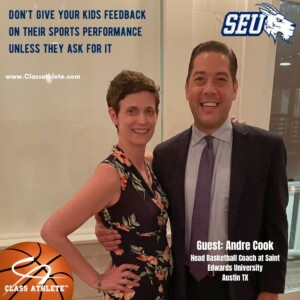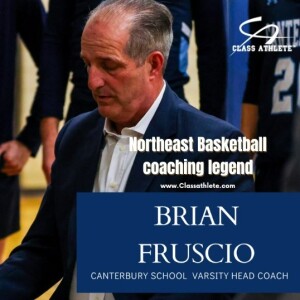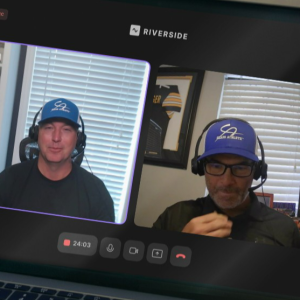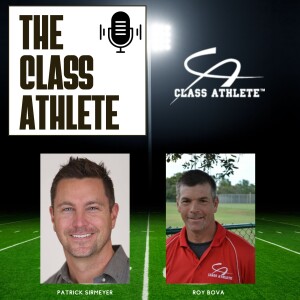The Class Athlete
The Class Athlete Podcast is hosted by the founder of The Class Athlete youth sports athletic league, Roy Bova along with Co-host Patrick Sirmeyer. Roy has over 20 years of experience in running and operating youth sports leagues where he and his team have placed emphasis on the devlopment of children to grow and become individuals of strong character, discipline and athletic abilities. In this podcast series, Roy and Patrick interview coaches, parents and former athletes to dig into the details of what is take to raise a first class child through sports.
Episodes

Wednesday Oct 30, 2024
Wednesday Oct 30, 2024
Summary
In this episode, Patrick Sirmeyer interviews Wes and Melissa Quinn, a husband and wife coaching duo in youth sports. They discuss their backgrounds, coaching philosophies, and the dynamics of coaching together while raising their three children. The conversation highlights the importance of fostering a love for sports, the competitive nature of their children, and the balance of communication and constructive criticism in their parenting approach. The Quinns share memorable moments from their coaching experiences and emphasize the significance of making sports enjoyable for kids.
Takeaways
Coaching youth sports is about fostering a love for the game.It's important to celebrate small successes in children's sports.Communication is key in coaching and parenting.Parents should model an active lifestyle for their children.Constructive criticism should be balanced with praise.Coaching together can strengthen family bonds.Every child is different and requires a tailored approach.Making sports fun is essential for children's engagement.Timing is crucial when discussing performance with kids.Memorable moments in sports can build confidence in children.
Titles
The Quinn Family's Coaching JourneyBalancing Family and Coaching
Chapters
00:00 Introduction to the Quinn Family and Their Coaching Journey03:30 Balancing Coaching and Professional Lives06:35 Family Dynamics in Sports09:23 The Competitive Nature of Siblings12:39 Coaching Philosophy for Youth Sports15:37 Memorable Moments in Youth Sports18:46 Navigating Coaching as a Couple21:47 Constructive Criticism and Communication with Kids24:34 The Importance of Praise and Support27:37 Trivia and Fun Facts about Sports30:38 The class athlete outro music.mp3

Thursday Oct 03, 2024
Thursday Oct 03, 2024
In this episode, Roy and Patrick welcome Brendan Abbey, an athletic trainer from Orlando Orthopedic, to discuss the importance of athletic training in youth sports. They explore topics such as early specialization, the role of parents, the significance of strength training, the dangers of performance-enhancing drugs, and the need for physical activity in children. Brendan emphasizes the importance of movement for both physical and mental health, and introduces the Ortho Navigator, a resource for parents to assess injuries and avoid unnecessary ER visits.
Early specialization in sports can lead to injuries.
Helicopter parenting can hinder children's recovery from injuries.
Strength training should focus on technique before weight.
Physical activity is crucial for children's development.
Isolation from technology can affect mental health.
Adderall misuse is a growing concern among athletes.
Proper nutrition and sleep are essential for young athletes.
Athletic trainers play a vital role in youth sports.
Community resources like Ortho Navigator can help families.
A holistic approach is necessary for athlete development.
Sound Bites
"Don't specialize too early."
"Movement can be medicine."
"The sooner you can get your kid active."
Chapters
00:00Introduction to Athletic Training and Youth Sports
02:54The Importance of Early Specialization and Parenting Styles
06:01The Role of Athletic Trainers in Youth Sports
08:58Strength Training and Conditioning for Young Athletes
12:04The Dangers of Performance-Enhancing Drugs
14:48The Need for Physical Activity in Youth
17:59The Impact of Technology on Youth Development
21:05The Ortho Navigator and Community Health
24:02Conclusion and Final Thoughtskeywords
athletic training, youth sports, injury prevention, strength training, performance enhancement, parenting styles, physical activity, mental health, technology impact, community health

Wednesday Sep 11, 2024
Wednesday Sep 11, 2024
summaryIn this conversation, Roy and Patrick interview Andre Cook, a Division II college basketball coach. They discuss Andre's journey from playing basketball in his youth to becoming a college coach, as well as his experience coaching his own children. The conversation touches on the importance of youth sports and the role of parents in supporting their children's athletic development. Andre emphasizes the need for parents to have fun, make friendships, and avoid being overzealous or overly critical during games. The conversation also highlights the positive impact of coaches and mentors in shaping young athletes. The conversation covers topics such as the traditional pathway in sports, the challenges of not making the high school team, and the importance of staying involved in youth sports. The coaches discuss the development of players and the emphasis on offense in their coaching strategies. They also touch on the concept of competition and the cardinal rules they teach their teams. The conversation concludes with a trivia question about the career record for the most college basketball points scored.
keywordsyouth sports, basketball, coaching, parenting, overzealous parents, mentorship, sports, traditional pathway, challenges, high school team, youth sports, player development, offense, competition, cardinal rules, college basketball
takeaways
Youth sports should focus on fun, friendships, and personal development rather than solely on winning or achieving scholarships.
Parents should avoid being overzealous or overly critical during games and instead support their children's athletic journey in a positive and encouraging manner.
Coaches and mentors play a crucial role in shaping young athletes and providing guidance and support.
Experiences, exposure to older athletes, and practice are key factors in a child's athletic development.
Youth sports can have a lasting impact on individuals, fostering a love for the game and teaching important life skills. The traditional pathway in sports is changing, with more opportunities for travel-related sports outside of high school teams.
Not making the high school team is not the end of a player's journey, and they can still pursue their passion by getting involved in youth sports programs.
Player development and skill-building are crucial for success in sports, with an emphasis on offense in the coaching strategies discussed.
Competition is an important aspect of sports, and players must understand the importance of working hard and earning playing time.
Coaches have cardinal rules or standards that they teach their teams to ensure they do the little things right and beat the competition.
The trivia question highlights the career record for the most college basketball points scored by Pistol Pete Maravich.
titles
The Lasting Impact of Youth Sports on Individuals
Parenting in Youth Sports: Avoiding Overzealousness The Changing Pathway in Sports
Player Development and Emphasis on Offense
Sound Bites
"Let's not ruin it by being overzealous. Let's not embarrass the kids because you're screaming at officials or coaching from the sideline."
"Do I want the next player to play at St. Edward's? Absolutely. Is it probably going to happen? No. So let's create the next good person in our society and change the way things are going."
"Parents could keep your kids from getting a $60,000 a year scholarship just because you're too overzealous."
"I don't think that's at eight years old."
"What do you advise that kid who still wants to play and those parents, where do they go, what do they do, even though he didn't make the high school team?"
"You fill it with video games? You fill it with, you know, Lacey, that's what you guys are. That's the foundation of what you're trying to do, right? Is keep kids involved and, uh, and it's positive and productive."
Chapters
00:00Introduction and Background
03:18Andre's Basketball Journey
06:30Coaching and Parenting
13:05The Importance of Fun and Personal Development in Youth Sports
15:38Parenting in Youth Sports: Avoiding Overzealousness
17:23The Role of Coaches and Mentors in Shaping Young Athletes
19:18Experiences, Exposure, and Practice: Key Factors in Athletic Development
21:21The Lasting Impact of Youth Sports on Individuals
23:06The Changing Pathway in Sports
25:43Staying Involved in Youth Sports
31:20Player Development and Emphasis on Offense
37:24The Importance of Competition and Cardinal Rules

Thursday Sep 05, 2024
Thursday Sep 05, 2024
summaryIn this episode, Roy and Patrick interview Brian Fruscio, a coach at Canterbury School. They discuss the impact of older athletes on younger ones, the importance of role models, and the influence of coaches in youth sports. Brian shares stories about his coaching career and the lessons he instills in his players through his cardinal rules. He also talks about his experience coaching his son and the strong family ties in his hometown. In this conversation, Brian discusses the importance of trust and building relationships with young athletes. He emphasizes the need to earn the trust of players before telling them the truth and offers advice for youth sports coaches and parents. Brian also shares his experience coaching players who have gone on to play collegiate athletics and highlights the importance of sending players to coaches who develop them both athletically and personally. The conversation ends with a trivia question about the longest winning streak in UConn women's basketball history.
keywords: youth sports, role models, coaching, Canterbury School, Albany Academy, cardinal rules, family ties, trust, relationships, youth sports, coaching, parents, collegiate athletics, UConn women's basketball
takeaways
Young athletes look up to older athletes as role models and are influenced by their behavior and performance.
Coaches play a significant role in shaping the lives of young athletes and instilling important values and skills.
Having strong family ties and a supportive community can contribute to the success of athletes.
Setting clear rules and expectations, such as Brian's cardinal rules, can help guide athletes and create a positive team culture.
Mental health is an important aspect of sports, and coaches should prioritize the well-being of their players. Building trust with young athletes is crucial before telling them the truth.
Coaches should take the time to get to know their players and earn their trust.
Parents should trust the coaches they put their children with.
Coaches play a role in disciplining children and preparing them for future challenges.
Sending players to coaches who develop them both athletically and personally is important.
The UConn women's basketball team had a winning streak of 111 games, which was broken by Mississippi State in 2017.
titles
Prioritizing Mental Health in Sports
The Impact of Role Models in Youth Sports Advice for Youth Sports Coaches and Parents
Developing Athletes Both Athletically and Personally
Sound Bites
"There's a youth kid out there who is looking at how you act, how you carry yourself, what you do, and they want to be the next you."
"I'm a huge baseball fan and I could take my son to go see, you know, a pro baseball game anytime. But when I take him to UCF in his mind, those guys are pros."
"All three of them were from one of the leads. So they understood us as one of the kids."
"We get a face touch in their dorm that night, text that night, for every teammate, managers included."
"I had a little cheat sheet so I can look down, that's sorta, I don't forget it on game day in practice, and I can promise you that."
"Brian, you're the first person I'm gonna say this to on any podcast, you legitimately helped me as a coach."
Chapters
00:00The Influence of Older Athletes and Role Models
06:39The Impact of Coaches in Youth Sports
17:10Trust and Accountability in Building Successful Teams
19:17The Importance of Positive Team Dynamics
27:11The Cardinal Rules of a Sports Program
32:46Building Trust and Getting to Know Players
35:29The Role of Parents in Youth Sports
36:28Discipline and Accountability in Player Development
43:06Prioritizing Mental Health in Youth Sports
44:41Effective Coaching Strategies
45:57Developing Players On and Off the Court
51:40The class athlete outro music.mp3

Friday Aug 30, 2024
Friday Aug 30, 2024
summary
In this episode, Patrick and Roy discuss their recent experiences with summer sports leagues and the upcoming flag football and soccer seasons. They talk about the challenges of running a league and the long hours involved. They also discuss the importance of good sportsmanship and positive coaching. They mention the success of some teams in the summer leagues and the upcoming parade for the Lake Mary Little League team that won the Little League World Series. They also mention the support they receive from sponsors and the impact it has on the league. They end the episode by inviting listeners to be guests on the podcast if they are involved in youth sports.
keywords
summer sports leagues, flag football, soccer, challenges, running a league, long hours, sportsmanship, positive coaching, team success, sponsors, youth sports
takeaways
Running a sports league requires long hours and dedication
Good sportsmanship and positive coaching are important
Support from sponsors is crucial for the success of the league
The Lake Mary Little League team's victory in the World Series is a source of pride
Listeners are invited to be guests on the podcast if they are involved in youth sports
titles
The Impact of Sponsors on the League
The Challenges of Running a Sports League
Sound Bites
"Running a league is almost a 24-hour job"
"Good sportsmanship is above anything in youth sports"
"The Lake Mary Little League team's victory was the first for a Florida team in the World Series"
Chapters
00:00Introduction and Summer Sports Leagues
13:41The Challenges of Running a Sports League
19:41The Importance of Sportsmanship and Positive Coaching
26:20The Impact of Sponsors on the League
28:10The Lake Mary Little League World Series Victory
31:20Inviting Listeners to Be Guests on the Podcast

Wednesday Aug 14, 2024
Wednesday Aug 14, 2024
Summary
Glenn Smith, a track and field coach and former Canadian national champion, joins the Class Athlete Podcast. He shares his background in track and field, including his training experiences and coaching career. Glenn emphasizes the importance of exposing children to various sports and allowing them to find their passion. He discusses the challenges and opportunities in youth track and field in Central Florida, highlighting the need for more track clubs and accessible facilities. The conversation also touches on coaching philosophy, creating a positive and fun environment, and preventing burnout in athletes. Glenn shares his personal best times in the 100 and 200 meters and the impact of technology on current records. The episode concludes with trivia questions about Olympic records in the 100 meters.
Keywords
track and field, coaching, youth sports, training, athlete development, coaching philosophy, burnout, Olympic records
Takeaways
Expose children to a variety of sports to help them discover their interests and talents.
Create a positive and fun environment in youth sports to foster enjoyment and engagement.
Individualize coaching approaches to meet the needs and goals of each athlete.
Balance training and rest periods to prevent burnout and optimize performance.
Technology advancements can impact athletic records and performance.
Get to know each athlete personally and show that you care about their well-being and progress.
Youth track and field in Central Florida would benefit from more track clubs and accessible facilities.
Titles
The Impact of Technology on Track and Field Records
Exploring the World of Track and Field with Glenn Smith
Sound Bites
"Expose them to a lot of different sports, find out what they're good at, what they enjoy."
"Just showing that you care, it doesn't have to be that much."
"Specializing in track and field is better to start a little bit older."
Chapters
00:00Introduction and Background
05:25Opportunities in Youth Track and Field
08:08Coaching Philosophy for Youth Sports
10:42The Importance of Movement and Concentration
15:14Coaching Individuals vs. Team Environment
18:08Specializing in Track and Field
20:09Personal Best Times in the 100 and 200 Meters
25:45Preventing Burnout in Track and Field
29:03Obsessiveness in Track and Field Athletes
31:14Trivia: Olympic Records in the 100 Meters

Wednesday Aug 07, 2024
Wednesday Aug 07, 2024
Summary
Sensei Juan Colon of Championship Martial Arts shares his journey in the martial arts industry and the impact it has on children's lives. He emphasizes the importance of building confidence and self-esteem through martial arts training. Sensei Juan also discusses the value of setting goals and the positive effects of martial arts on overall athleticism. He highlights the joy of seeing his students become instructors and give back to the community. The conversation also touches on how martial arts can benefit special needs children and the importance of treating them the same as other students. Trivia questions about famous athletes with martial arts backgrounds and the origin of the term 'martial arts' are also discussed.
Keywords
martial arts, confidence, self-esteem, goals, athleticism, special needs, instructors, community, famous athletes, origin
Takeaways
Martial arts can build confidence and self-esteem in children, helping them overcome challenges and develop a positive self-image.
Setting goals and achieving them through martial arts training can boost confidence and provide a sense of accomplishment.
Martial arts can enhance overall athleticism, improving balance, coordination, and strength.
Treating special needs children the same as other students in martial arts classes can help them develop confidence and feel included.
Seeing students become instructors and give back to the community is a rewarding experience for martial arts instructors.
Famous athletes like Phil Mickelson and Clay Matthews have attributed their success in their respective sports to their martial arts training.
The term 'martial arts' is derived from the Latin term 'Arts of Mars,' referring to the Roman god of war.
Titles
Uncovering the Origin of the Term 'Martial Arts'
Famous Athletes and Their Martial Arts Backgrounds
Sound Bites
"I can see a kid, really shy kid that barely knows how to interact with other people... and going through those struggles... they just grow, man. And that for me, that's what he does it for me."
"There is no better confidence than self-defense confidence. When you know that you can defend yourself, not that you have to go and use it."
"When I get to see my instructors get to impact other people's life... now I get to see that, you know, so it's awesome."
Chapters
00:00Introduction and Background
03:35Impact of Martial Arts on Children
05:39Value of Martial Arts for Young Students
09:24Setting Goals and Achieving Success
12:18From Students to Instructors
15:55Approaching Special Needs Children
19:05Repetition and Progression in Martial Arts
25:51Trivia and Conclusion
29:49The class athlete outro music.mp3

Friday Aug 02, 2024
Friday Aug 02, 2024
SummaryBaylin Trujillo, a former Division I quarterback and private quarterback coach, shares his journey and insights on training young athletes. He emphasizes the importance of starting sports at a young age and playing multiple sports to develop motor skills, cognitive skills, leadership skills, and coordination. Trujillo believes that quarterback play is 90% mental and that natural ability is crucial for the position. He highlights the need for quarterbacks to have a strong understanding of the game, including their responsibilities, the defense, protections, play calls, and concepts. Trujillo also emphasizes the importance of being coachable and embracing the process of training and development. In this conversation, Baylin Trujillo emphasizes the importance of tough coaching and the need for athletes to earn their success. He believes in pushing athletes to their limits and not sugarcoating their performance. Trujillo also stresses the significance of mental strength and understanding the game as key qualities for quarterbacks. He encourages parents to support their children's passions and to provide honest evaluations of their abilities. Trujillo concludes by highlighting the importance of reading the Bible and building a relationship with God.
Keywords
Baylin Trujillo, Division I quarterback, private quarterback coach, training, young athletes, starting sports, multiple sports, motor skills, cognitive skills, leadership skills, coordination, quarterback play, mental, natural ability, understanding the game, coachable, training process, coaching, tough coaching, earning success, mental strength, understanding the game, parents, evaluations, passion, Bible, God
Takeaways
Starting sports at a young age and playing multiple sports helps develop various skills and attributes in young athletes.
Quarterback play is primarily a mental game, with about 90% of the position relying on mental abilities.
Natural ability and a feel for the game are crucial for quarterbacks, although skills can be taught and developed.
Quarterbacks need to have a strong understanding of the game, including their responsibilities, the defense, protections, play calls, and concepts.
Being coachable and embracing the training process are essential for success in quarterback development. Tough coaching is essential for athletes to reach their full potential and not be misled by false praise.
Mental strength and understanding the game are crucial qualities for quarterbacks.
Parents should support their children's passions and provide honest evaluations of their abilities.
Reading the Bible and building a relationship with God can bring positivity and gratitude into athletes' lives.
Titles
The Mental Game of Quarterback Play
The Role of Natural Ability in Quarterbacking The Importance of Tough Coaching and Earning Success
Developing Mental Strength and Understanding the Game
Sound Bites
"Getting them in there early...is going to be more beneficial later on down the road."
"Quarterback is all mental...90% mental."
"I believe you're born with that ability...kids are born to be a quarterback."
"You earn the good job because at the end of the day, that's not going to get you better."
"I don't dummy down things. I don't dummy down my terminology when it comes to training."
"Fall in love with the process of work ethic commitment, honing your craft."
Chapters
00:00Introduction and Background
17:04Starting Sports at a Young Age
21:36The Mental Aspect of Quarterback Play
26:14The Role of Natural Ability in Becoming a Successful Quarterback
26:47The Significance of Being Coachable
27:12Supporting and Encouraging Children's Involvement in Sports
31:53Qualities of a Successful Quarterback
37:32Supporting Your Child's Passion
49:03Finding Purpose and Gratitude in Sports
51:58The class athlete outro music.mp3

Monday Jul 15, 2024
Monday Jul 15, 2024
Summary
DK Taylor, founder of BNA Sports, discusses his background in football and youth sports, as well as the challenges and rewards of running a youth sports program. He emphasizes the importance of providing a pro-like experience for kids and the value of volunteer coaches. DK also talks about the tournaments his league participates in and the selection process for coaches and teams. He offers advice for parents considering putting their child on a competitive team and highlights the financial and playing time considerations. The conversation concludes with a trivia question about the boxer with the most knockouts in heavyweight boxing history.
Keywords
DK Taylor, BNA Sports, youth sports, football, tournaments, volunteer coaches, competitive teams, pro-like experience
Takeaways
DK Taylor is the founder of BNA Sports, a youth sports league in central Florida.
He has a background in football and has worked in the NFL for eight years.
BNA Sports offers flag football, basketball, soccer, and cheerleading.
DK brings tournament opportunities to his teams and helps navigate the process.
Volunteer coaches are an essential part of the league, and finding quality coaches can be a challenge.
Parents should consider the financial aspects and playing time when deciding to put their child on a competitive team.
DK emphasizes the importance of providing a pro-like experience for kids in youth sports.
Billy Bird holds the record for the most knockouts in heavyweight boxing history.
Titles
Choosing a Competitive Team: Considerations for Parents
Navigating Tournaments and Volunteer Coaches in Youth Sports
Sound Bites
"Why 99% of kids can't have a pro-like experience."
"Balance the negative with some positive."
"Do the research beforehand before you commit."
Chapters
00:00Introduction and Background of DK Taylor and BNA Sports
03:38The Importance of Providing a Pro-Like Experience for Kids
08:00The Role of Volunteer Coaches in Youth Sports
13:45Participating in Tournaments and Selecting Teams
16:54Transitioning from Recreational Teams to Competitive Teams
24:50The class athlete outro music.mp3

Tuesday Jul 09, 2024
Tuesday Jul 09, 2024
SummaryIn this episode of the Class Athlete Podcast, Patrick Sirmeyer and Roy Bova interview Cameron Windt, a former Class Athlete League player who is now a college basketball player. They discuss Cameron's journey from playing multiple sports to focusing on basketball, the importance of playing multiple sports for overall development, the role of coaches in shaping young athletes, the challenges of transitioning from high school to college basketball, and the importance of confidence and hard work in overcoming slumps. Cameron also shares his college selection process and offers advice to young athletes aspiring to play in college.
KeywordsClass Athlete Podcast, Cameron Windt, multiple sports, college basketball, coaches, confidence, hard work, college selection process
Takeaways
Playing multiple sports at a young age helps develop different skills and keeps athletes in shape.
Coaches who genuinely care about the well-being and development of their players have a positive impact on young athletes.
Transitioning from high school to college sports requires adjusting to the increased speed and intensity of the game.
Confidence and hard work are essential in overcoming slumps and achieving success in sports.
When selecting a college, it's important to consider the environment, coaching staff, and opportunities to showcase skills.
Parents and educators play a crucial role in instilling a strong work ethic and academic discipline in student-athletes.
Titles
The Benefits of Playing Multiple Sports
The Impact of Coaches on Young Athletes
Sound Bites
"Probably just play whatever you want to do, just work on it every day, even if it's just a little bit, try and have fun and just be confident."
"I'm naturally a very confident person, but throughout junior and senior year, I kind of struggled with basketball confidence."
"You cannot steer a parked car. If you're out there shooting and you're moving around, guess what? You're getting out of that slump. You gotta outwork the slump all day long."
Chapters
00:00Introduction and Background
06:55The Importance of Playing Multiple Sports
12:24The Role of Coaches and Parents in Athlete Development
20:48Building Confidence and Overcoming Slumps
25:23The class athlete outro music.mp3


